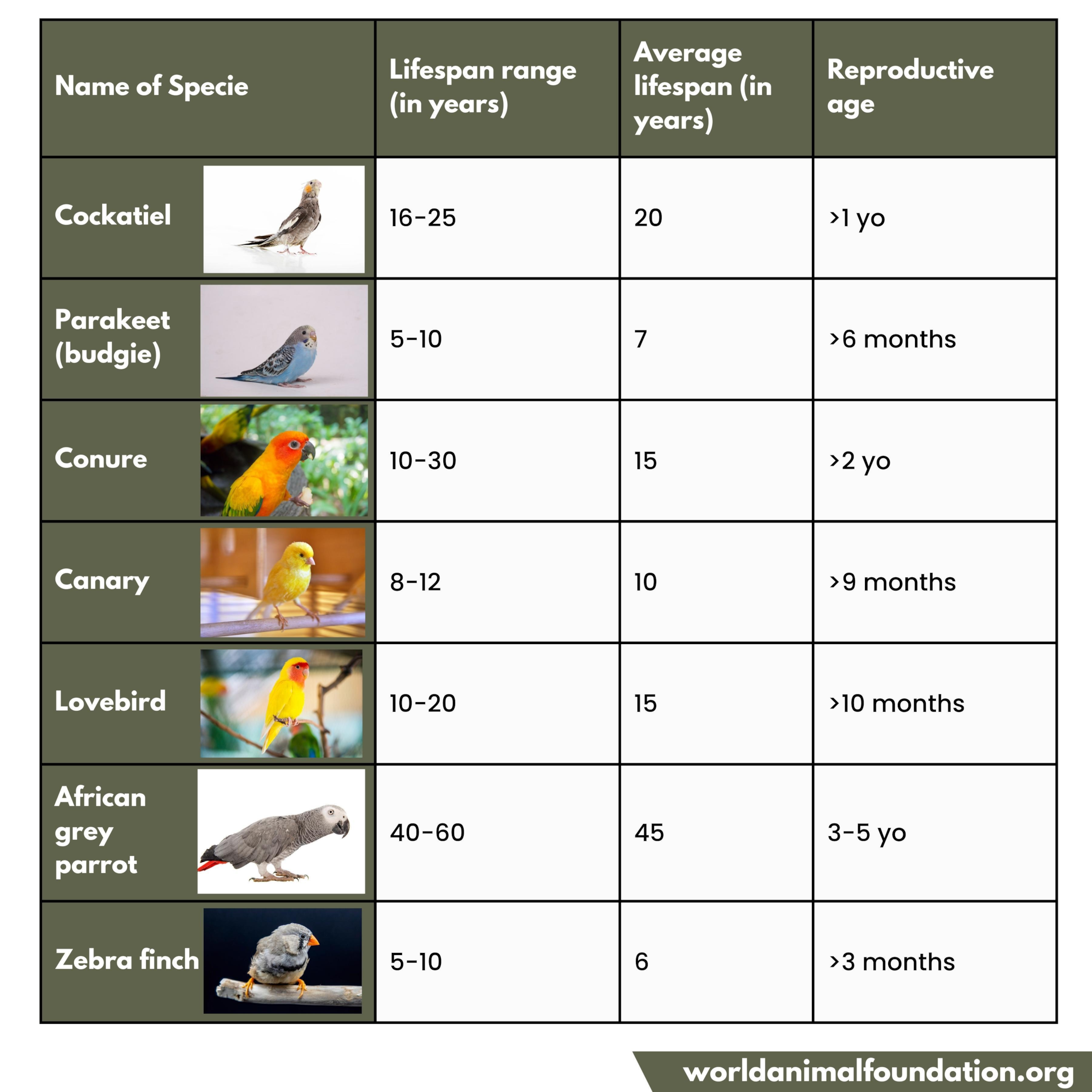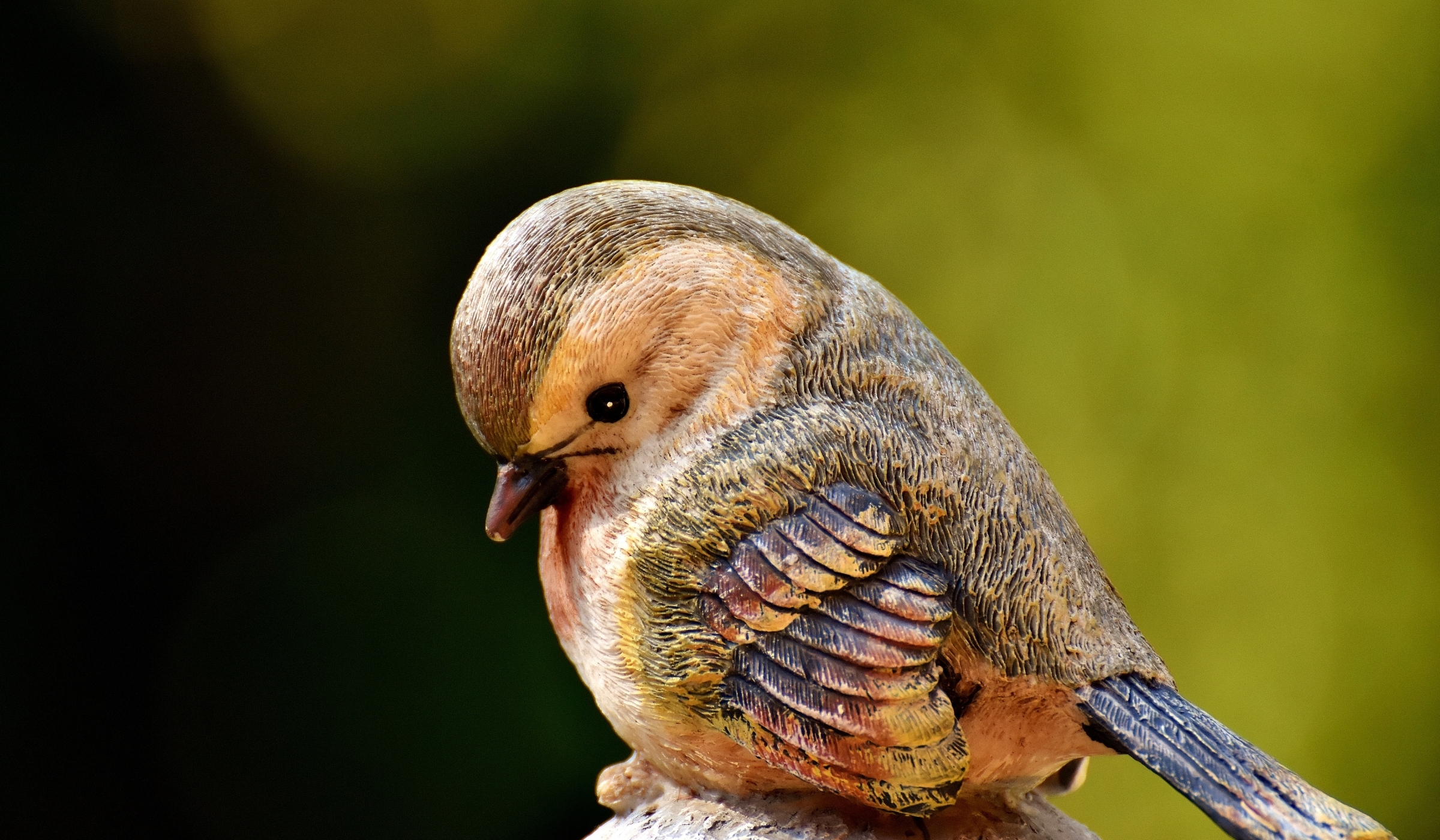Ever wondered if your parakeet is going through its ‘teenage’ years or if your macaw is now a wise old elder? Use our bird age calculator: a fascinating tool that deciphers the avian age mystery, bridging the gap between bird years and human years. Dive in to unlock a fresh perspective on your feathered friend’s journey through life.
Bird Age Calculator
How to Calculate Bird’s Years to Human Years
Calculating a bird’s age in relation to human years can be an intriguing endeavor. This is primarily because birds, unlike mammals, have varying lifespans depending on the species. Therefore, there isn’t a single fixed ratio like the often-cited “1 dog year equals 7 human years.”
- Species Variation: The lifespan of birds varies widely based on the species. For example, parrots, especially larger ones like Macaws, can live up to 50 years or more in captivity, whereas smaller birds like canaries or budgerigars might live around 7-15 years on average.
- Basis of Comparison: A simple method of calculating a bird’s age in human years is by comparing the average life span of a bird to that of a human age. For instance, if a bird species typically lives up to 15 years and human average life expectancy is up to 80 years, then 1 bird year would approximately be equivalent to 5.3 human years.However, it’s essential to note that this is a generalized approach, and individual variations exist.
- Developmental Milestones: Like observing molt patterns, another way to compare is by considering developmental milestones. Birds often reach maturity much quicker than humans.For instance, many small birds might be ready to breed within their first year, akin to humans entering puberty in their early teens. Using this method provides a different ratio and is often more reflective of the bird’s stage in life rather than its chronological age.
- Limitations: It’s worth noting that these calculations can be oversimplified. Factors like diet, environment, and overall care can significantly influence a budgie life and quality of life.
General Insight to Bird Age Calculator
The concept of calculating a budgie’s age in relation to average human life expectancy is both fascinating and complex. This calculator serves as a tool to bridge the understanding between avian and human life cycles, offering insights into the comparative ages of our feathered companions.
At its core, this birds age calculator takes into account the average lifespan of a particular bird species and contrasts it with the human average lifespan. By establishing a ratio between the two, we get a rough equivalent of the bird’s age in human years.
There’s no universal formula for finding the age of your feathered friend. We can begin by understanding the average lifespan of the specific bird species. Using that information, we create a formula that compares the bird’s age to an average human lifespan:
bird age = human age × bird average lifespan ÷ human average lifespan
In our calculator, we’ve set the default average human lifespan to 72.6 years based on the UN’s estimates for 2019. As such, while it’s a helpful tool, it should not be the sole basis for any crucial decisions related to a bird’s health or well-being.
What is the Average Lifespan of Pet Birds
The average lifespan of pet birds varies widely based on species, care, diet, and environment. Understanding these factors is essential for bird owners, as it helps in providing appropriate care.

Age of larger birds
Large birds, especially parrots, tend to have a longer lifespan. Species like Macaws and African Grey Parrots can live anywhere from 40 to 60 years, sometimes even longer in well-maintained captive environments.
These lifespans are similar to humans, making them a lifelong commitment for pet owners. Proper care, including mental stimulation and a balanced diet, can contribute to their longevity.
Age of oldest birds
Some birds are known to have lived extraordinarily long lives. One notable example is a Sulphur-crested Cockatoo named Fred, who was reported to have lived for over 100 years in captivity.
In the wild, albatrosses are known for their longer lifespans, with some recorded to have lived over 50 years. This impressive lifespan may be attributed to factors such as genetics, diet, environment, and the absence of predators.
How to Increase the Life Expectancy of Your Pet Bird
Increasing the life expectancy of your pet bird involves a holistic approach that ensures its physical, mental, and emotional well-being. The following are essential strategies to consider:
- Balanced Diet: Just like humans, birds require a balanced diet to thrive. This includes seeds, fruits, vegetables, and for some species, proteins. Commercially available bird foods are usually well-balanced but always research what is best for your specific bird species. Fresh water should always be available.
- Regular Check-ups: Annual veterinary check-ups are crucial. Birds often hide symptoms of illness until it’s advanced, so proactive care can catch and treat potential issues early.
- Clean Environment: Birds can be sensitive to environmental factors. Keep their cage clean, and ensure fresh air circulation. Remove uneaten food daily to prevent mold and bacteria growth. Ensure their living space is free from drafts, direct sunlight, and toxic fumes (like those from non-stick pans or certain cleaning agents).
- Mental Stimulation: Birds are intelligent creatures that require mental engagement. Toys, foraging activities, puzzles, and regular interaction with their human companions can keep them mentally active and reduce stress.
- Physical Exercise: Depending on the size and type of the bird, they might need flying time outside their cage or climbing activities. This not only strengthens their muscles but also improves cardiovascular health.
- Safe Environment: Protecting your bird from potential dangers is essential. This includes other pets, toxic plants, open windows or water sources, and harmful chemicals.
- Social Interaction: Birds are social animals. Depending on the species, they might thrive better in pairs or small groups. Additionally, daily interaction with their human caregivers fosters bonding and reduces feelings of isolation.
FAQs
How to tell the age of a budgie?
Young budgies often have horizontal stripes on the forehead that recede as they age. By 6-8 months, the stripes usually fade, and the cere (skin above the beak) becomes more pronounced. Their eye color can also change, with young budgies having fully black eyes that later develop an iris ring.
What is the age of my cockatiel?
To determine a cockatiel’s age accurately, you’d need information from its breeder or a veterinarian. However, juveniles often have striped patterns beneath their tail feathers, which disappear with their first molt, typically around 6-9 months.
How long do parrots live?
The lifespan of parrots varies with species. While smaller parrots like budgies might live 5-10 years, larger parrots such as Macaws and African Greys can live between 40-60 years or even longer in ideal conditions.
What is the age of the oldest bird alive?
As of my last update in September 2021, Wisdom, a Laysan albatross, is the oldest known wild bird at over 70 years. She resides on the Midway Atoll in the Pacific Ocean.
What is the average age of a pigeon?
In the wild, pigeons often live 3-5 years due to predators and other hazards. However, in captivity or as pets, pigeons can live up to 15 years with proper care.
Conclusion
Whether you’re a bird lover, a pet owner, or simply someone intrigued by the complexity of nature, our tool brings to life the wonder and diversity of birds, reminding us of the intricate connections and parallels between our lives and theirs.
It’s a reminder that caring for birds is a lifelong commitment, one that rewards us with joy, companionship, and endless opportunities for discovery.


